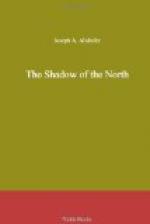A splendid figure, tall, heroic, the nose lofty and beaked like that of an ancient Roman, the feather headdress brilliant and defiant like that of Tayoga, came forward to meet them, and Robert saw with intense pleasure that it was none other than Daganoweda himself. Nor was the delight of the young Mohawk chieftain any less—the taciturnity and blank faces of Indians disappeared among their friends—and he came forward, smiling and uttering words of welcome.
“Daganoweda,” said Willet, “the sight of you is balm to the eyes. Your name means in our language, ‘The Inexhaustible’ and you’re an inexhaustible friend. You’re always appearing when we need you most, and that’s the very finest kind of a friend.”
“Great Bear, Tayoga and Dagaeoga come out of the great wilderness,” said Daganoweda, smiling.
“So we do, Daganoweda. We’ve been there a long time, but we were not so idle.”
“I have heard of the fort that was built in the forest and how the young white soldiers with the help of Great Bear, Tayoga and Dagaeoga beat off the French and the savage tribes.”
“I supposed that runners of the Hodenosaunee would keep you informed. Well, the fort is there and our people still hold it, and we are here, anxious to get back into the main stream of big events. Who are at the fire, Daganoweda?”
“Waraiyageh (Colonel William Johnson) himself is there. He was fishing yesterday, it being an idle time for a few days, and with ten of my warriors I joined him last night. He will be glad to see you, Great Bear, whom he knows. And he will be glad to meet Tayoga and Dagaeoga who are to bear great names.”
“Easy, Daganoweda, easy!” laughed Willet.
“These are fine lads, but don’t flatter ’em too much just yet. They’ve done brave deeds, but before this war is over they’ll have to do a lot more. We’ll go with you and meet Colonel Johnson.”
As they walked toward the fire a tall, strongly built man, of middle years, dressed in the uniform of an English officer, came forward to meet them. His face, with a distinct Irish cast, was frank, open and resolute.
“Ah, Willet, my friend,” he said, extending his hand. “So you and I meet again, and glad I am to hold your fingers in mine once more. A faithful report has come to us of what you did in Quebec, and it seems the Willet of old has not changed much.”
The hunter reddened under his tan.
“It was forced upon me, colonel,” he said.
Colonel William Johnson laughed heartily.
“And he who forced it did not live to regret it,” he said. “I’ve heard that French officers themselves did not blame you, but as for me, knowing you as I do, I’d have expected no less of David Willet.”
He laughed again, and his laugh was deep and hearty. Robert, looking closely at him, thought him a fine, strong man, and he was quite sure he would like him. The colonel glanced at him and Tayoga, and the hunter said:




